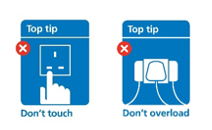Plugs and appliance wiring

Managing electricity safely can reduce the risk of fires and electric shocks:
- Check electrical cords and plugs regularly for any signs of damage.
- Look for fraying, exposed wires, or loose connections. These should be immediately replaced.
- Overloading outlets by connecting too many appliances to a single socket can cause overheating and potentially spark a fire.
- Avoid using extension leads as a permanent solution and give high-energy consuming devices such as space heaters or air conditioners their own dedicated circuit.
- Use the socket calculator to see if you are overloading your sockets.
- Use surge protectors for sensitive electronic equipment, such as computers, TVs, and home entertainment systems.
- These safeguard your devices from voltage spikes or power surges.
- Only use properly rated and certified appliances.
- Unplug appliances when not using them, instead of leaving them in standby mode.
- Avoid attempting any DIY electrical jobs such as rewiring, as it can lead to incorrect installations and hazardous conditions.
- Instead, find a certified electrician for any electrical installations, repairs, or modifications.
- Have the electrical wiring in your home inspected by a professional electrician at least once every few years, or whenever you suspect any issues.
- Keep electrical appliances away from water sources, such as sinks, bathtubs or pools.
- Mixing electricity and water can lead to fatal electrical shocks.
- Make sure that your hands are dry before plugging or unplugging any electrical devices.
- Teach children to never play with electrical outlets, cords, or appliances.